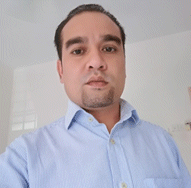 Wan Mazidi Wan Jaafar graduated from the University of Science in Malaysia in 2001. He worked in R&D at Perodua Manufacturing Sdn Bhd for 10 years as a manager in the Material Testing Department. He was on the development team for the first Perodua design and build, the Perodua Myvi. He has also worked in Japan with the Toyota and Daihatsu teams for a year.
Wan Mazidi Wan Jaafar graduated from the University of Science in Malaysia in 2001. He worked in R&D at Perodua Manufacturing Sdn Bhd for 10 years as a manager in the Material Testing Department. He was on the development team for the first Perodua design and build, the Perodua Myvi. He has also worked in Japan with the Toyota and Daihatsu teams for a year.
He was selected by the MD of Perodua to bring back the paints and coating technology from Toyota which was later implemented in Perodua.
He joined Korex in 2011 as a director. His responsibilities include building connections with people all over the world, especially in Europe, Australia, and Japan.
He wants to create a new path for the company by expanding their expertise. His company found a venture in the commodity business, which is a little different from the automotive industry. They are also planning on accommodating the DAQ system to be implemented in the commodity business by creating a system like a small scale pilot production for SMEs.
Sachi Mulmi (SM), researcher with Frost & Sullivan, had an opportunity to conduct a Movers & Shakers interview with Wan Mazidi (WM) – Director of Korex Group.
SM: Can you start by providing our readers a brief overview of your company including the vision behind its formation and its current role in the market?
WM: Korex is a company dealing with Test Instruments and monitoring devices like DAQ. Now, Korex has expanded into a new field to design and build systems like a Pilot Scale production plant, Skid processing systems, some custom processing machines and more for commodity industries.
SM: What is the unique value proposition of your company, and what are your key competitive differentiators?
WM: Korex has a team in design and fabrication. We also have system integrators especially for SCADA systems (DAQ). Our knowledge comprises of Materials Engineering as well as paints and coatings technology for automotives, which I can say is unique. All the knowledge was gathered from my experience from various industries like automotive and oil and gas.
SM: Is the market growing, how long will it continue to grow, and at what rate?
WM: It is very hard to compete just selling a single instrument. Our company has started to customize systems for our customers by adopting and combining the instruments we have. The market is growing very slowly, especially in Malaysia. I would say it is growing about 5%-10% year-on-year.
SM: What are the factors driving the growth of the market?
WM: Purchasing power of the end product. The manufacturer will not expand their production capacity or upgrade their line if there is little demand.
SM: What are the restraints?
WM: Price for imported products is a little high due to the unfavorable currency exchange for MYR. Some customers are starting to request Taiwanese products which are less reliable and robust compared to European products to try and save on the initial investment cost.



